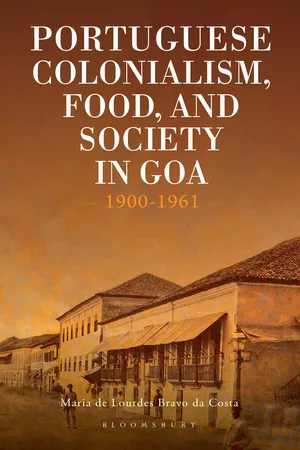
Portuguese Colonialism, Food, and Society in Goa
1900-1961
- English
- ePUB (mobile friendly)
- Available on iOS & Android
About this book
This interdisciplinary study examines the food history of colonial Goa between 1900 and 1961, foregrounding the centrality of food in the region's sociocultural, economic, and political life. Drawing on archival materials, periodicals in Konkani, Portuguese, and English, oral history, folklore, and literary sources, the book brings together perspectives from anthropology, history, and literary studies to analyse how food scarcity and abundance shaped everyday experiences and power structures.
Focusing on the staple crop of rice, the work explores its symbolic and material significance in Goan society, particularly through a close reading of O Signo da Ira by Orlando da Costa. The study reveals how rice shortages empowered elite landlords, entrenched social hierarchies, and intensified the exploitation of mundkars (tenant labourers) and small cultivators by gaunkars (village elites) and the Comunidade agrarian institution. It critiques the collusion between landlords and the colonial government in manipulating rice prices and maintaining systemic inequities through taxation and landholding practices.
By recovering the voices and struggles of the subaltern classes, this book offers a nuanced and critical history of food in Goa during the late colonial period. It addresses a significant gap in Goan historiography, highlighting food as a vital lens through which to understand colonialism's enduring impact on everyday life.
Frequently asked questions
- Essential is ideal for learners and professionals who enjoy exploring a wide range of subjects. Access the Essential Library with 800,000+ trusted titles and best-sellers across business, personal growth, and the humanities. Includes unlimited reading time and Standard Read Aloud voice.
- Complete: Perfect for advanced learners and researchers needing full, unrestricted access. Unlock 1.4M+ books across hundreds of subjects, including academic and specialized titles. The Complete Plan also includes advanced features like Premium Read Aloud and Research Assistant.
Please note we cannot support devices running on iOS 13 and Android 7 or earlier. Learn more about using the app.
Information
Table of contents
- Cover
- Halftitle Page
- Title Page
- Dedication Page
- Contents
- Tables
- Acknowledgments
- Abbreviations
- Glossary
- Introduction
- 1 Rice, the Perennially “Insufficient” Goan Staple: A Study of O Signo da Ira (The Sign of Wrath) and Other Historical Literature
- 2 Food, the Memory Connector: A Study of Goan Folklore and Other Forms of Literature
- 3 Feasts and Traditions: Borrowing to Celebrate Festivities, and the Resultant Indebtedness
- 4 The Drink That “Cheers” but Brings Tears
- 5 The Economic Blockade and the Pangs of Hunger
- Conclusion
- Notes
- Bibliography
- Index
- About the Author
- Imprint